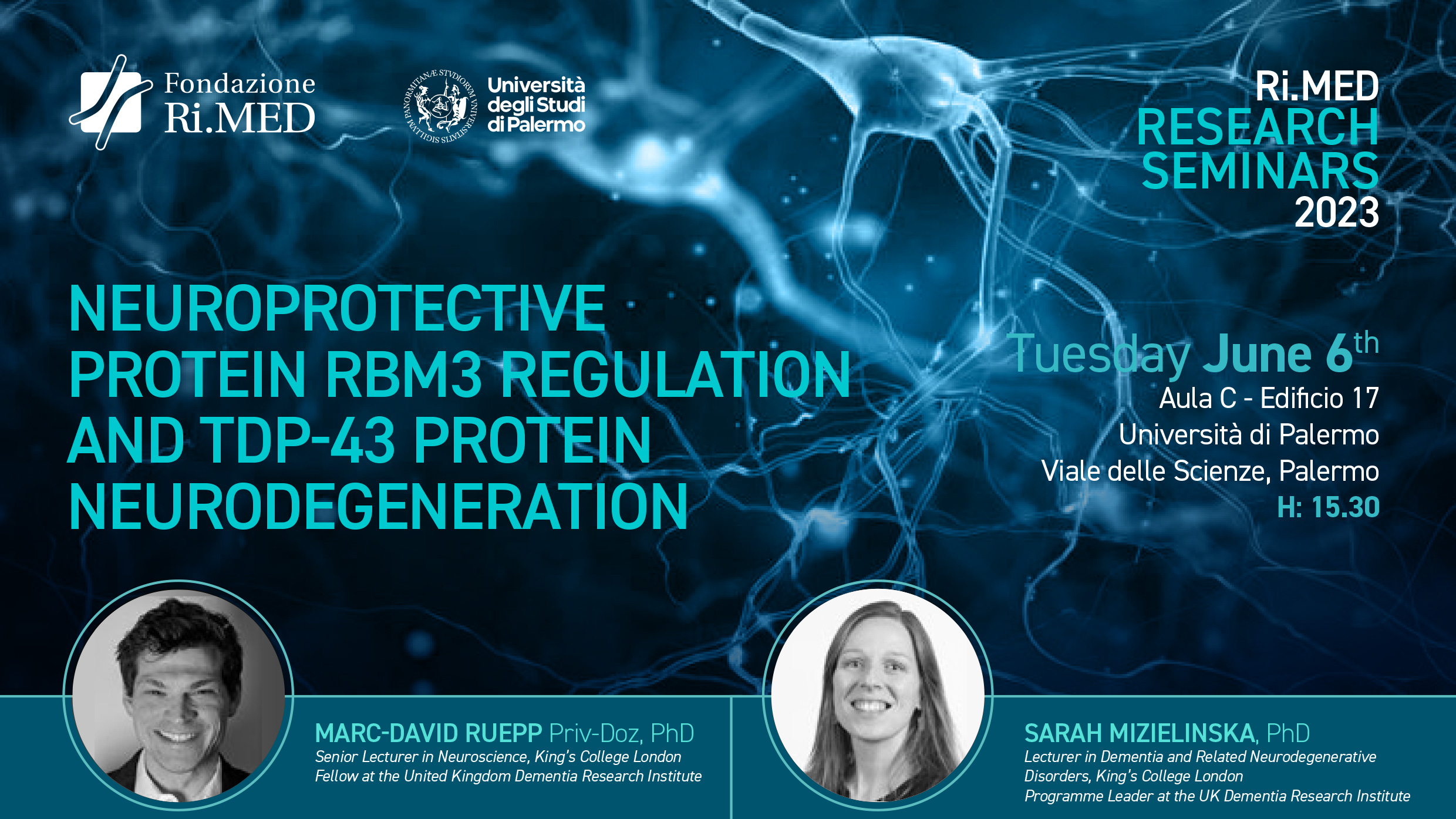The fourth Ri.MED Research Seminar took place on Tuesday 6th June h 15.30 – 17:00, Aula C Edificio 17, Viale delle Scienze, Palermo and will collect 2 outstanding contributions:
Marc-David Ruepp Priv-Doz, PhD
Senior Lecturer in Neuroscience, King’s College London
Fellow at the United Kingdom Dementia Research Institute
“HNRNPH1 regulates the neuroprotective cold-shock protein RBM3 expression through poison exon exclusion”
Abstract: Enhanced expression of the cold-shock protein RNA binding motif 3 (RBM3) is highly neuroprotective both in vitro and in vivo. Whilst upstream signaling pathways leading to RBM3 expression have been described, the precise molecular mechanism of RBM3 induction during cooling remains elusive. During this talk I will present our latest research from a collaborative project with the Mallucci Group (University of Cambridge/Altos) in which we set out to elucidate the molecular mechanism by which cells regulate the expression of this neuroprotective protein.
Biosketch: Priv.-Doz. Dr. Marc-David Ruepp is a Reader in RNA Biology and Molecular Neurodegeneration at the UK Dementia Research Institute at King’s College London. He received his PhD in 2009 (Graduate School of Cellular and Biomedical Sciences, University of Bern) and his Venia Docendi in RNA Biology in 2018. He is interested in RNA metabolism in health and disease with a specific focus on neurodegeneration. His research group works on the physiological functions of the FET family of proteins and the neuroprotective cold-shock protein RBM3, the identification of converging pathomechanisms in ALS/FTD as well as the development of therapeutic approaches to prevent or alleviate neurodegeneration.
Sarah Mizielinska, PhD
Lecturer in Dementia and Related Neurodegenerative Disorders, King’s College London
Programme Leader at the UK Dementia Research Institute
“Using single molecule, biophysical and cell approaches to unveil structure-function alterations to the nuclear pore in C9ORF72 TDP-43 proteinopathy”
Abstract: Cytoplasmic mislocalisation and aggregation of the RNA-binding protein TDP-43 is characteristic in amyotrophic lateral sclerosis (ALS) and the overlapping disorder frontotemporal dementia (FTD), including that associated with the C9ORF72 mutation. Nucleocytoplasmic transport dysfunction of TDP-43 has long been implicated in this proteinopathy. Thus, we investigate how molecular dynamics and organization of the nuclear pore, through which all nucleocytoplasmic transport occurs is disrupted to gain insight into the earliest cellular changes that initiate TDP-43 mislocalisation and neurodegeneration.
Biosketch: Sarah has been working in the field of neurodegeneration for 13 years, focusing on the two overlapping neurodegenerative disorders – frontotemporal dementia (FTD) and amyotrophic lateral sclerosis (ALS). She has published 24 papers, including a first-author article in Science in 2014, and in 2015 was awarded the UCL Early Careers Neuroscience Prize. In 2016 she joined King’s College London as a Lecturer and was appointed a Fellow of the UK Dementia Research Institute in 2017. Her research is focused on the FTD/ALS pathomechanisms emanating from mutation in the gene C9ORF72 and converging on TDP-43 proteinopathy – particularly investigation into nucleocytoplasmic transport dysfunction using innovative microscopy and biophysical approaches.

